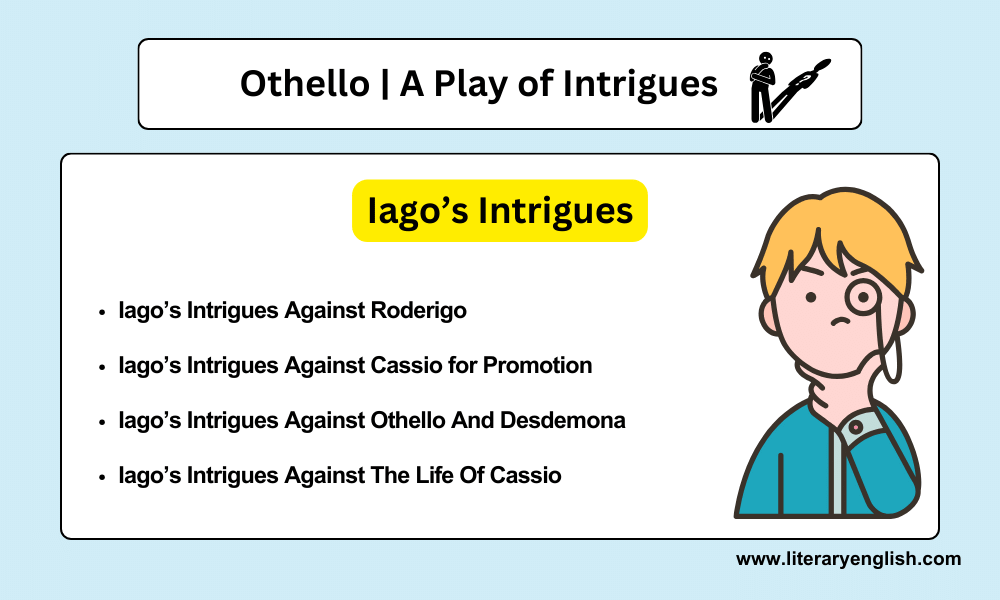“Othello” is a tragedy by William Shakespeare where we find a series of Iago’s intrigues one after one manipulated to fulfil his own villainous ends.
Iago’s intrigues lead to the tragedy’s catastrophic conclusion. Below, we have explained each of Iago’s intrigues set out in the play.
Iago’s Intrigues against Roderigo
Roderigo is a wealthy but foolish gentleman who is in love with Desdemona. Iago exploits Roderigo’s passion by promising to help him win Desdemona’s love in exchange for money and support. Iago convinces Roderigo to sell his lands and give him money to use for bribing Desdemona, assuring Roderigo that Desdemona will soon tire of Othello. Iago uses Roderigo’s financial resources to further his own schemes and keeps him in a state of hope and despair to maintain control over him. Iago uses Roderigo to incite Brabantio against Othello, hoping to disrupt Othello’s marriage to Desdemona from the start. Roderigo is strung along by Iago’s false promises, ultimately leading to his involvement in a plot to murder Cassio. When Roderigo begins to suspect Iago’s deceit, Iago murders him to keep his plots secret.
Iago’s Intrigues against Cassio for Promotion
Cassio is Othello’s loyal lieutenant, and Iago is envious of his promotion. Iago sets out to disgrace Cassio and remove him from his position. Iago gets Cassio drunk, knowing that Cassio cannot hold his liquor. This leads to a brawl between Cassio and Roderigo, which results in Cassio wounding Montano, the governor of Cyprus. Othello, upon witnessing the disorder, demotes Cassio from his lieutenancy, falling into Iago’s trap. Iago advises Cassio to seek Desdemona’s help in restoring his reputation, knowing this will further his larger plot against Othello. Cassio loses his position and reputation, and his attempts to seek Desdemona’s intercession play into Iago’s next intrigue, increasing Othello’s suspicion and jealousy.
Iago’s Intrigues against Othello and Desdemona
Iago’s main plot is to destroy the love between Othello and Desdemona by making Othello believe that Desdemona is unfaithful. Iago hints to Othello that Cassio is too familiar with Desdemona, sowing the seeds of doubt and jealousy. Iago arranges situations where Desdemona’s pleas for Cassio seem like signs of infidelity. He places Desdemona’s handkerchief, a symbol of Othello’s love, in Cassio’s possession to further “prove” her unfaithfulness. Iago carefully manipulates conversations, so that Othello overhears Cassio speaking about Bianca, but Othello believes he is speaking about Desdemona. Othello’s trust in Desdemona deteriorates, leading him to confront her violently and ultimately murder her, believing she has betrayed him with Cassio.
IV. Iago’s Intrigues against the Life of Cassio
After using Cassio to inflame Othello’s jealousy, Iago decides Cassio must die to ensure his own schemes are not uncovered. Iago convinces Roderigo that killing Cassio will help him win Desdemona. Iago sets up an ensnare for Cassio. Roderigo attacks Cassio but fails to kill him, and Cassio wounds Roderigo. Iago wounds Cassio from behind to avoid suspicion and then kills Roderigo to prevent him from exposing their plans. Cassio survives the attack, but Roderigo is killed by Iago. The failed murder attempt leads to the exposure of Iago’s plots when letters are found on Roderigo’s body revealing Iago’s manipulations.
Conclusion
In “Othello,” Iago’s intrigues are the foundation of the play, driving the narrative forward and leading to the ultimate downfall of the main characters. Each intrigue is carefully crafted to exploit the weaknesses and circumstances of those around him, describing Shakespeare’s masterful depiction of manipulation and the tragic consequences that arise from it. Iago’s complex intrigues not only highlight his cunning and villainy but also serve to illustrate the brittleness of trust and the destructive power of deceit.
